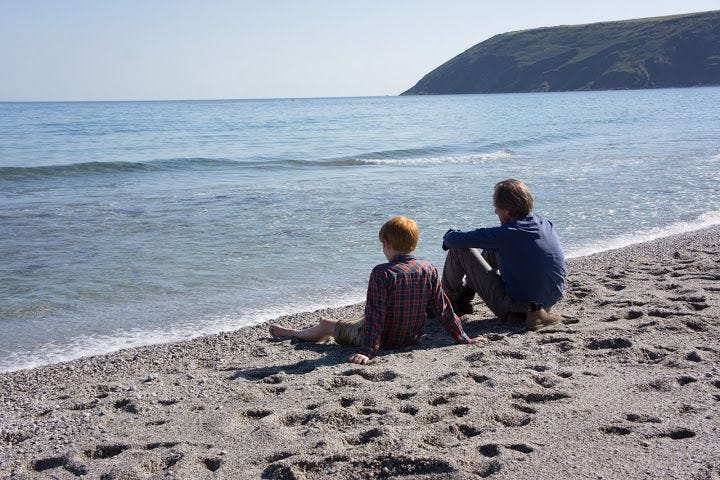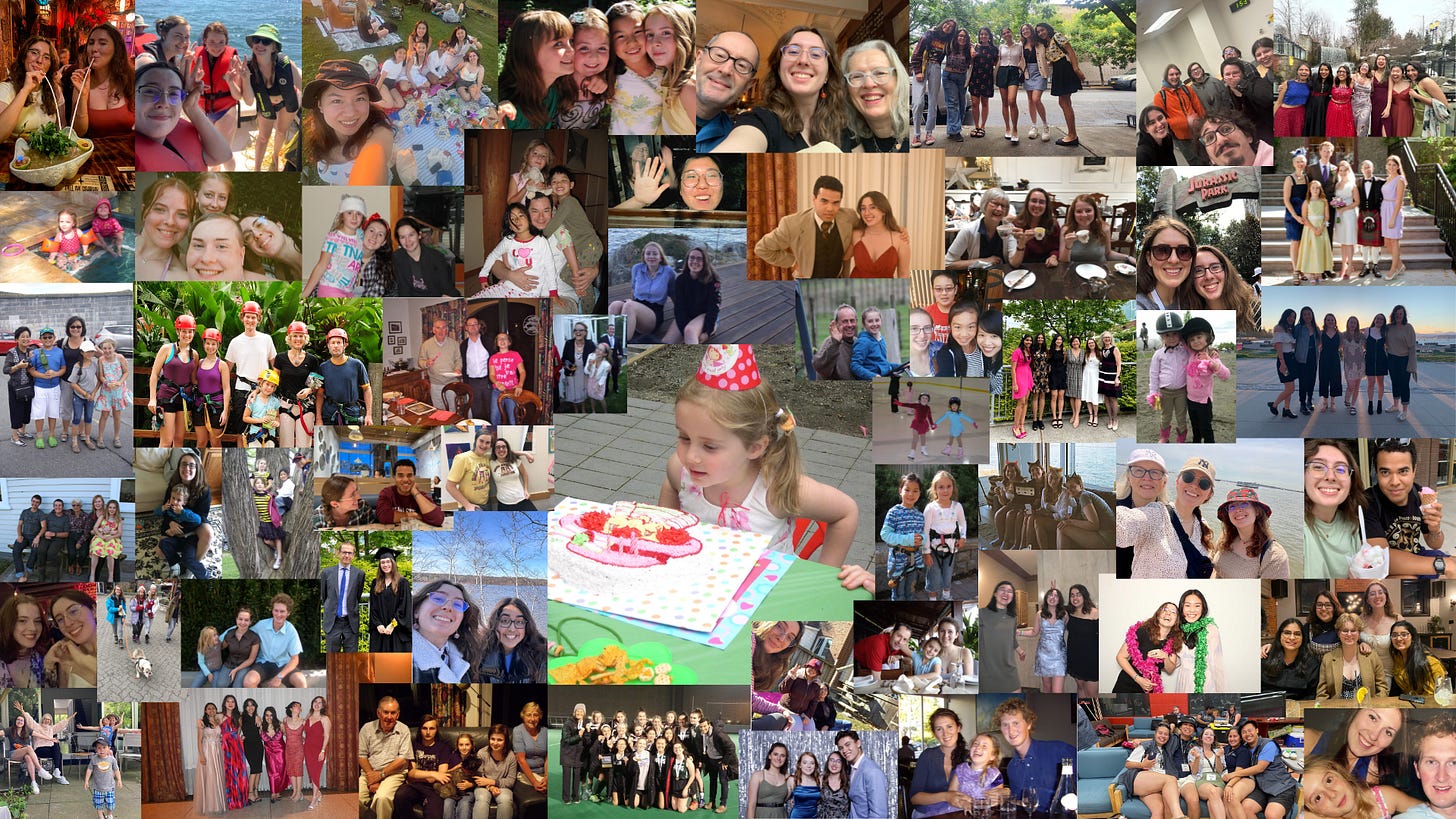It's About Time
What if i just kept writing about media I like? (I promise I'll switch it up soon)
My birthday was this week which meant I didn’t work on my thesis and instead watched a movie.
Which movie? Well, it’s in the title of this piece: About Time (2013).
This is one of my favourite movies. It’s the perfect mix of romanticizing everyday life, dated humour to make fun of, and Bill Nighy.
I present, the briefest of summaries:
About Time (2013) follows Tim (Domhnall Gleeson) learning from his father (Bill Nighy) that the men in his family can travel back in time, only within their own lifespan. With this information, Tim decides he will use this ability to find a girlfriend, saying: “For me, it was always going to be about love.”1 The film goes on to demonstrate his journey finding love and getting re-dos whenever something is too awkward. Which it is often. Prepare yourself for second-hand embarrassment.2
If you’ve seen the movie (or are watching it along with this blog post—kudos if so), you will notice that this summary only covers about the first half of About Time (2013). That’s because, while this movie is broadly a “time-travel romcom,” that is but a farce. It’s really not about that; it’s about time. Watching Tim’s journey, we are told multiple lessons about time and about love. And while it’s about time, it’s also about those who are travelling through time. So, if you’d let me, I’d like to take a look at a couple of characters and what they share.
There will be spoilers in the following! I don’t think they ruin the movie, however, because the story isn’t in the plot but, instead, it’s in experiencing the love. BUT, a warning nevertheless.
Mary: About Love, Imperfection, and Romance

Yes, this can be broadly described as a romcom. There is romance and it often happens in comedic scenarios. I mean, the plot follows a character—self described as too tall, too skinny, too orange—who is using time travel to undo socially awkward fumbles throughout his journey for love.3
We can get into the discourse about the ethics behind time travel in relationships—especially when one party does not know. As Jen so aptly put it, “would you be mad if your significant other About Time-ed you? Most likely people would respond: yes! I agree. But, like I said, the “rom com” aspect is a small part of what this actually is.
One broadly “good” aspect of Tim and Mary’s relationship is how they work without Tim needing to time travel. At their first meeting, there was a genuine connection. Time travel was mainly used to try and re-create that connection after a different time travel “overwrote” their initial meeting. Not to say it’s morally ok. It’s weird how he memorized her interests and quoted her thoughts back to her. We also can’t ignore the fact that he broke up her and the boyfriend that she would’ve met in a different timeline. What I want to talk about is how, with Mary, Tim sees that things don’t need to be perfect. There is space for both their quirks and awkwardness. Especially after their rainy-and-windy-day wedding, he asks if she would have wished they picked “another less wet day.”4 Mary responds with, “No. Not for the world.”5 Rather than focusing on making the days perfect, Mary shows how appreciation for the imperfections can make life equally beautiful.
Dear Uncle Desmond: About Love, Pain, and Beauty

BIG SPOILERS INCOMING IN THE REST OF THE POST !!! Final warning !!!
Also, quick CW for mentions of cancer, drunk driving, and the death of a parent.
At Tim and Mary’s wedding, his father (Bill Nighy) insists on re-doing the best man speech to say, explicitly, that he loves Tim.
“I’ve only loved three men in my life. My dad was a frosty bugger, so that only leaves dear Uncle Desmond, B.B. King, obviously, and this young man here.”6
Nearing the end of the film, Tim and Mary learn of James’s cancer diagnosis and return to Cornwall with their children to visit.7 In a conversation with Uncle Desmond about the diagnosis, Desmond shares his feelings to Tim.
“I’m very unhappy about it, Tim. At your wedding he said he loved me. … That was the best day of my life. So this is probably the worst.”8
Uncle Desmond simultaneously shows how love and pain can come together. With love, there is a sort of promise to pain: from death, sickness, or hardship faced by those you love. However, in focusing on avoiding pain, you will never experience said love. I guess there’s a certain type of beauty, then, in both this happiness and pain. It shows you’ve loved and have been loved.
Kit Kat: About Love, Care, and Learning
Kit Kat is described by many in her family as a free spirit—acting opposite to Tim’s awkward, self-consciousness. However, as they grow up and move out, Kit Kat is shown to have a hard time adjusting to life alone. After an car accident caused by her drinking, Tim learns the extent of her experience: the bad boyfriend, the alcohol, and her repeated quitting of jobs.
Tim: “We have to do something to fix it.”
Mary: “Yeah. But, you know, if it’s going to be fixed, I think she probably has to do it herself.”
Tim: “Maybe. Maybe not.”9
Tim goes on to use his time travel to try and help Kit Kat. He drives her rather than having her drive herself—a temporary solution that only stops that one accident. He takes her back in time to stop her from meeting Jimmy, her horrible boyfriend—it works, but the result is his family with Mary being drastically altered.10
Tim helping Kit Kat with time travel isn’t a fix. It’s too much for one person and does not give her the time to work through things herself.
“Maybe, just maybe, I’m the faller. Every family has, like, someone who falls, who doesn’t make the grade, who stumbles, who life trips up. Maybe I’m our faller.”11
Let’s use Kit Kat’s analogy to look at this resolution. In trying to fix her situation FOR Kit Kat with time travel, Tim is trying to carry her without consideration of her. In that case, no one flies and she doesn’t even have the chance to try. The solution that actually has effect is the one proposed by Mary: allowing Kit Kat to fix it herself. After sitting with Kit Kat while she recovers in the hospital room, Tim and Mary don’t offer solutions. They stay with her on the ground until she comes to them herself. Once she has taken the time to learn to, and is ready to, fly, they can all make it together. Kit Kat is not a faller, no one is. She has fallen, but can get back up again. And, as Tim learns, love doesn’t always mean solving problems for people. It sometimes means sitting with someone and giving them the space, and time, to learn in their own way.
James: About Time

Here we are at the end. It’s time to answer the question, what about time? James, both being Tim’s father and the one who teaches him about time travel, is one of the most important figures in Tim’s journey through life and time. However, like the discussion above, he knows the way for Tim to grow fully isn’t to tell him the answers. When he first drops the time travel bomb (metaphorically), he doesn’t offer definite solutions. He only gives guidance.
How do you use time travel? He won’t say how. He’ll tell you what he did.12 And he’ll tell you what not do to.13 Before Tim has a chance to test out and learn about time himself, his father will not divulge secrets. Until, that is, there’s not much time left.
With James’s cancer diagnosis, he tells Tim three things:
Not to feel like this is a failure: “I never said we could fix things, I specifically never said that. Life’s a mixed bag, no matter who you are.”14
Not to feel cheated by time travel, as it allowed him to live his life to his fullest: “The only people who give up work at 50 are the time travellers with cancer who want to play more table tennis with their son.”15
And, the big secret. The most important thing.
“And so he told me his secret formula for happiness. Part one of the two part plan was that I should just get on with ordinary life, living it day by day, like anyone else. … But then came part two of dad’s plan. … He told me to live every day again almost exactly the same. The first time with all the tensions and worries that stop us noticing how sweet the world can be, but the second time noticing.”16
James didn’t use time travel to better his life, instead he used it to highlight the beauty that already exists. With time travel, he could re-live his days knowing that they would end ok. Instead of focusing on where he was going, he could focus on where he is. If you’ve talked to me at any point before, you’d know I’m a huge fan of the everyday. I love little coffeeshop trips, reading on my porch, and being around people I love. But sometimes I am bad at enjoying the everyday. It’s hard when there’s so much to do and the days just keep passing. A big thing I’m working on within this is taking the time to consider the present rather than spending all my energy on the possible future. Enough about me, though, let’s finish up this movie!
Tim(e): About Everyday
After James’s death, Tim continues to visit him in memories. When Mary is about to give birth to their third child, Tim is left with one final visit with his father. The two play table tennis and recreate a childhood walk along the beach, skipping stones together. Only at this point does Tim tell us, the audience, what he has learned.
“And in the end, I think I’ve learned the final lesson from my travels in time. And I’ve even gone one step further than my father did. … The truth is, I now don’t travel back at all. Not even for the day. I just try to live everyday as if I’ve deliberately come back to this one day to enjoy it as if it was the full final day of my extraordinary, ordinary life.”17
I find it so absolutely wild that the conclusion of the movie so beautifully disregards its premise. Yes, it’s about a guy who can time travel. But, through all of it, what he comes to is that the way to fully appreciate life is to not time travel at all. Or, that’s not really true. As Tim leaves us with:
“We’re all travelling through time together every day of our lives. All we can do is do our best to relish this remarkable ride.”18
What a blend of the extraordinary and ordinary. It’s not about time TRAVEL, but about TRAVELING IN TIME. Like we are now: me, writing this post and you, reading it. I’m so incredibly lucky to be stumbling, running, resting, flying, and traveling though time with you all. This past summer, my friends and I were discussing love languages, and I still stand by my choice that my favourite way of receiving love is quality time. Time spent together: the conscious choice to be here, doing whatever, when there are multitudes of possibilities. With everything possible in the world, I would rather be no where else but here.
To all those reading—and all those not—thank you for journeying through time with me. If I’ve learned anything from my 22 years (officially 8035 days), it’s that the people who join you through time make the real difference. I can’t wait to spend more days alongside you all. Until next time.
Yours ordinarily,
Tess <3
About Time (2013) 0:10:13
However, as Amarah said: “It’s not as bad because you know that it doesn’t really matter or happen if he time travels to undo it.” (slightly paraphrased because I don’t have a photographic memory—even for Amarah)
About Time (2013) 0:01:01
About Time (2013) 1:16:07
About Time (2013) 1:16:12
About Time (2013) 1:14:12
I warned about serious spoilers this late into the post!
About Time (2013) 1:35:56
About Time (2013) 1:21:17
This is some weird About Time time travel rule about not going back in time to change anything before the birth of a child. If you, the circumstances that allowed THAT child to be born will not be the same, therefore you will be left with a completely different child.
About Time (2013) 1:21:48
“For me, it’s books, books, books. I’ve read everything a man could wish to. Twice. Dickens three times.” (About Time (2013) 0:9:16)
Tim: “…money would be the obvious thing.” James: “Very mixed blessing. Utterly screwed up your grandfather’s life. Left him without love or friends. I’ve never bumped into a genuinely happy rich person.” Tim: “It would be nice not to work.” James: “No, that’s a real recipe for disaster. Look what happened to Uncle Fred.” Tim: “What happened to Uncle Fred?” James: “Sod all. Wasted his life. You have to use it for things that you really think will make your life the way you want it to be.” (About Time (2013) 0:9:29)
About Time (2013) 1:38:02
About Time (2013) 1:38:20
About Time (2013) 1:39:20
About Time (2013) 1:53:50
About Time (2013) 1:55:43






you have no right to post this a month before our lease is up! no right!
About Time (2013, 123 minutes) you shared your love of this movie with the world!